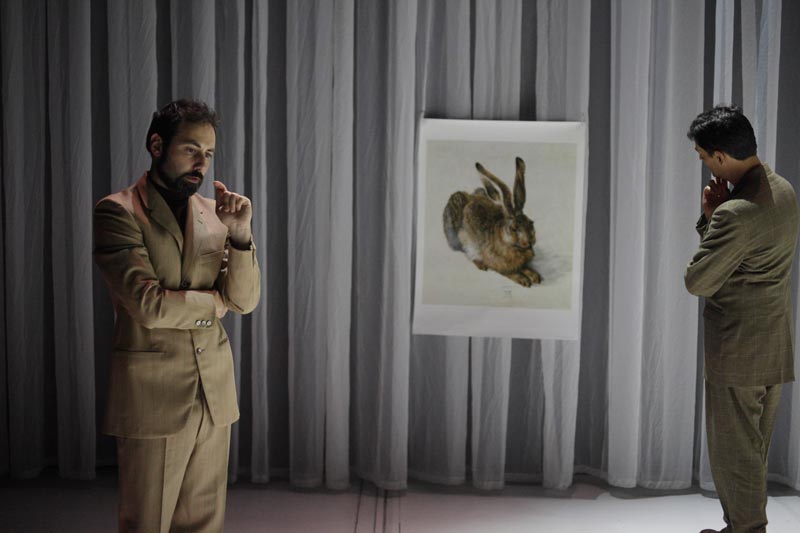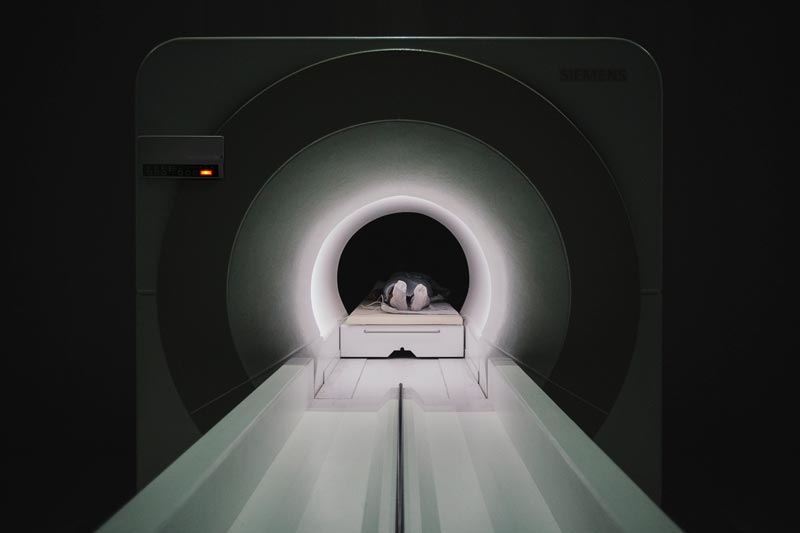★★★★½ Technically brilliant, conceptually challenging and wholly engaging.
Dunstan Playhouse, Adelaide Festival Centre
February 25, 2016
Elegantly dressed citizens attend a gallery set behind a scrim. They obsessively and repetitively compare each other under the watchful eye of Dürer’s Young Hare, until the mechanically inquisitive, ego-driven, yet juvenile evaluations, lead to the cracking and deflating of an individual. The golden calf of aestheticism is omnipresent as an early nod to the subject; the life of Moses, as narrated in the Book of Exodus. The house lights are still up, and some think the performance is yet to start; such is our conditioning. But we have already entered Director Romeo Castellucci’s world, and so far, he’s gently telling us to shut our mouths and open our eyes and ears.
The filmic vignette gives way to a nightmarish scene of power and pain. A large turbine spins with violence and anger. The certain knowledge that the heads of hair that descends from above will catch in the rotating mechanism and the accompanying dread-inducing sound effect makes for frightening viewing. The inevitability of the scene is part of its objectionable magnetism; Castellucci has slipped into our subconscious and he’s starting to make a mess in there.

Luca del Pia, Adelaide Festival of Arts
Rascia Darwish’s cubicle portrait is set upstage at such a distance as to initially suggest we might be somehow protected, but there is no hiding from this incredibly powerful and confronting picture. We hear audience gasps as she haemorrhages all over a public toilet floor whilst giving birth, but silence as she reveals she is more concerned with the aesthetics of the bloody mess in the room, than her own health. Emoticons do nothing to lift our spirits, but speak eloquently to the banality within our culture.
Dialogue (translated from Italian) when it comes, feels underwhelming, and almost unnecessary. Castellucci’s genius is in the visualisation of his concepts. Regardless, the discourse driven scene between Sergio Scarlatella and Darwish is potent in its desperation. Without much in the way of revelation or explanation, it relives the horror story of a baby left in a bin bag; the sort of headline infrequently read and never comprehended.
We time travel to a sepia-toned cave where primitive existence is at its most basic, and survival does not come with pleasantries. The dwellers are naked and exposed, and here, Gloria Dorliguzzo’s grief, and sense of loss is palpable and her appeal for help, genuine and deeply moving. Later, Darwish makes an exodus into an MRI time machine, and comes out the other side to find her history, or perhaps, mankind’s past.

Guido Mencari, Adelaide Festival of Arts
Music by Scott Gibbons is a highlight of this technically brilliant work. Sung pieces O Heavenly King and Wade in the Water add beautiful light to some fairly shady expositions of humanity accompanied by brutal soundscapes. The technical excellence makes this production visually compelling, but Castellucci also carries the sound effects from one scene into another, long seconds before the imagery has arrived, giving us a sense of expectation that is often whipped away like a simple magic trick. It is brilliantly unnerving.
Unlike its spiritual namesake, there is little in the way of lament to end this tale. Surprisingly, Go Down, Moses leaves us with a very distinct sense of hope. It’s no small amount of effort to be exposed to this didactic work, and despite, or perhaps because of its expose of shame, greed, brutality and abject stupidity by us mere humans, the rewards are immense. Procreation, recreation, domination and salvation thematically intertwine in this slowly paced time bomb that is certain to leave you pondering humanity’s plight.
Go Down, Moses plays at Adelaide Festival until February 28











Comments
Log in to join the conversation.